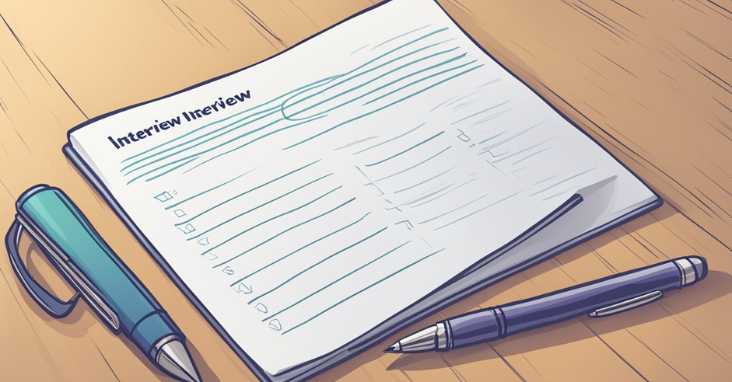What are strategic interview questions to ask candidates ? Strategic interview questions probe skills, fit, and potential, focusing on problem-solving, adaptability, and alignment with company goals.
Strategic interviewing is a vital component of the hiring process. It allows hiring managers to identify the best candidates for the job and assess their potential to contribute to the company’s success. However, conducting a successful strategic interview requires careful planning and preparation. One of the most critical aspects of this process is asking the right questions.

Crafting effective interview questions is an art that requires skill and experience. The questions you ask must be carefully crafted to provide insight into a candidate’s skills, experience, and personality. They must also be tailored to meet the specific needs of your organization. By asking the right questions, you can gain a deeper understanding of a candidate’s potential and determine whether they are the right fit for your company.
In this article, we will explore the different types of strategic interview questions to ask candidates, analyze candidate responses, and provide tips for effective interviewing techniques. We will also discuss how to determine cultural and strategic fit, and assess candidates after the interview process. By the end of this article, you will have a better understanding of how to conduct successful strategic interviews and hire the best candidates for your organization.
Key Takeaways
- Crafting effective strategic interview questions to ask candidates requires skill and experience.
- Asking the right questions can provide insight into a candidate’s potential and determine whether they are the right fit for your company.
- Analyzing candidate responses and assessing for cultural and strategic fit are critical components of the hiring process.
Understanding Strategic Interviewing
Defining Strategic Interview Questions to Ask Candidates
Strategic interview questions to ask candidates are designed to assess a candidate’s ability to think critically, solve problems, and make decisions in a professional setting. These questions are carefully crafted to elicit thoughtful responses from candidates, providing employers with valuable insights into their skills, experience, and overall fit for the job.
Strategic interview questions to ask candidates can take many forms, including behavioral-based questions that ask candidates to describe how they have handled specific situations in the past, situational questions that ask candidates to hypothesize how they would handle hypothetical scenarios, and open-ended questions that allow candidates to showcase their creativity and critical thinking skills.
Importance of Strategic Questions in Hiring
Strategic interview questions to ask candidates are a critical component of the hiring process. By asking the right questions, employers can gain a deeper understanding of a candidate’s skills, experience, and overall fit for the job. This information can help employers make more informed hiring decisions, reducing the risk of turnover and increasing the likelihood of long-term success.
Moreover, strategic questions can help employers identify candidates who possess the qualities and skills necessary to succeed in a rapidly changing business environment. With the pace of technological change accelerating, employers need to identify candidates who are adaptable, innovative, and able to think critically. Strategic interview questions to ask candidates can help employers identify these candidates, ensuring that they are well-positioned to succeed in the years ahead.
To learn more about the importance of strategic questions in hiring, check out this article from the Society for Human Resource Management.
Crafting Your Interview Strategy
When it comes to interviewing candidates, having a solid strategy in place can make all the difference in finding the right fit for your company. By aligning questions with company culture, assessing skills and qualifications, and evaluating personality and character, you can ensure that your interviews are effective and efficient.
Aligning Questions with Company Culture
One important aspect of interviewing candidates is ensuring that they are a good fit for your company culture. This means asking questions that not only assess their skills and qualifications, but also their values and beliefs. By doing so, you can determine whether they will be a good fit for your team and contribute to a positive work environment.
To align your strategic interview questions to ask candidates with your company culture, consider the following:
- What are your company’s core values and beliefs?
- What traits and behaviors are important for success in your organization?
- How can you assess a candidate’s alignment with your company culture during the interview process?
By answering these questions, you can craft strategic interview questions to ask candidates that will help you evaluate a candidate’s fit with your company culture.
Assessing Skills and Qualifications
Another important aspect of interviewing candidates is assessing their skills and qualifications. This means asking questions that can help you determine whether they have the necessary experience and expertise to succeed in the role.
To assess a candidate’s skills and qualifications, consider the following:
- What specific skills and qualifications are required for the role?
- How can you evaluate a candidate’s skills and qualifications during the interview process?
- What types of questions can you ask to determine a candidate’s level of expertise?
By answering these questions, you can craft strategic interview questions to ask candidates that will help you assess a candidate’s skills and qualifications.
Evaluating Personality and Character
Finally, it’s important to evaluate a candidate’s personality and character during the interview process. This means asking questions that can help you determine whether they have the right temperament and character traits to succeed in the role.
To evaluate a candidate’s personality and character, consider the following:
- What personality traits and character traits are important for success in the role?
- How can you assess a candidate’s personality and character during the interview process?
- What types of questions can you ask to determine a candidate’s temperament and character traits?
By answering these questions, you can craft interview questions that will help you evaluate a candidate’s personality and character.
Overall, by aligning questions with company culture, assessing skills and qualifications, and evaluating personality and character, you can ensure that your interviews are effective and efficient. For more information on crafting effective strategic interview questions to ask candidates, check out this resource from SHRM.
Types of Strategic Interview Questions to Ask Candidates
When it comes to hiring the right candidate, asking the right questions is crucial. Strategic strategic interview questions to ask candidates can help you evaluate a candidate’s skills, experience, and fit for the role. Here are some types of strategic interview questions to ask candidates that can help you make an informed decision:
Behavioral Interview Questions
Behavioral strategic interview questions to ask candidates are designed to assess a candidate’s past behavior and performance in different situations. These questions can help you understand how a candidate has handled challenges in the past and how they might approach similar situations in the future. Examples of behavioral interview questions include:
- Can you describe a difficult situation you faced at work and how you handled it?
- Tell me about a time when you had to work with a difficult colleague. How did you handle the situation?
- Can you give an example of a project you worked on that required you to use your problem-solving skills?
Situational Questions
Situational questions are hypothetical scenarios that can help you evaluate a candidate’s ability to handle different situations that may arise in the role. These questions can help you understand how a candidate thinks and approaches problems. Examples of situational questions include:
- What would you do if you were faced with a difficult customer who was unhappy with your product/service?
- How would you handle a situation where a team member was not meeting their deadlines?
- What steps would you take to resolve a conflict between two team members?
Problem-Solving and Critical Thinking Questions
Problem-solving and critical thinking questions can help you evaluate a candidate’s ability to analyze complex problems and come up with effective solutions. These questions can help you understand how a candidate approaches problem-solving and whether they have the necessary skills for the role. Examples of problem-solving and critical thinking questions include:
- Can you give an example of a time when you had to think creatively to solve a problem?
- How do you prioritize tasks when you have multiple projects with competing deadlines?
- Can you walk me through your process for analyzing data and making decisions based on that data?
Using a combination of these types of strategic interview questions to ask candidates can help you make an informed decision when hiring a candidate. For more information on strategic interview questions to ask candidates, check out this resource from SHRM.
Analyzing Candidate Responses

When conducting an interview, it’s important to not only ask the right questions but also to analyze the responses given by the candidates. This section will cover some key areas to focus on when analyzing candidate responses.
Identifying Red Flags and Deal Breakers
One of the primary goals of an interview is to identify any red flags or deal breakers that may disqualify a candidate from consideration. These could include a lack of relevant experience, poor communication skills, or a negative attitude.
To identify these red flags, it’s important to listen carefully to the candidate’s responses and pay attention to any inconsistencies or gaps in their answers. It’s also important to ask follow-up questions to clarify any areas of concern.
Assessing Communication and Interpersonal Skills
Effective communication and strong interpersonal skills are essential for success in many roles. During the interview, it’s important to assess the candidate’s ability to communicate clearly and concisely, as well as their ability to listen actively and respond thoughtfully.
One way to assess these skills is to ask open-ended questions that require the candidate to provide detailed responses. It’s also important to pay attention to the candidate’s body language and nonverbal cues, as these can provide valuable insights into their level of comfort and confidence.
Recognizing Leadership Potential and Team Dynamics
Leadership skills and the ability to work effectively as part of a team are highly valued in many organizations. During the interview, it’s important to assess the candidate’s potential to lead and their ability to work collaboratively with others.
To assess leadership potential, it’s important to ask questions that require the candidate to demonstrate their ability to take initiative, make decisions, and inspire others. To assess team dynamics, it’s important to ask questions that require the candidate to describe their experience working in a team and their approach to resolving conflicts.
Overall, analyzing candidate responses is a critical part of the interview process. By focusing on key areas such as red flags, communication and interpersonal skills, and leadership potential, employers can make more informed hiring decisions and build strong, effective teams. For more information on conducting effective interviews, check out this resource from the Society for Human Resource Management.
Effective Interview Techniques

When conducting an interview, it is important to use effective techniques to get the most out of the candidate. Here are a few techniques that can help:
Using Open-Ended and Follow-Up Questions
Asking open-ended questions is a great way to get the candidate to reveal more about themselves and their experiences. Instead of asking yes or no questions, ask questions that require a more detailed response. For example, instead of asking “Have you worked with project management tools before?” try asking “Can you tell me about your experience with project management tools?” This will give the candidate the opportunity to provide more detail and showcase their knowledge.
Follow-up questions are also important to ask during an interview. These questions allow the interviewer to dig deeper into a response and get more information. For example, if the candidate mentions a specific project they worked on, ask follow-up questions such as “What was your role in the project?” or “Can you tell me about any challenges you faced during the project?”
Understanding the Role of Non-Verbal Cues
Body language can reveal a lot about a candidate. Pay attention to their posture, eye contact, and facial expressions. If a candidate is slouching or avoiding eye contact, they may not be confident or engaged in the interview. On the other hand, a candidate who is sitting up straight and making eye contact may be more confident and enthusiastic.
It is also important to be aware of your own body language as an interviewer. Make sure you are sitting up straight and maintaining eye contact with the candidate. This will help create a comfortable and engaging interview environment.
Creating a Comfortable Interview Atmosphere
Creating a comfortable interview atmosphere is crucial to getting the most out of the candidate. Make sure the interview room is well-lit and at a comfortable temperature. Offer the candidate a glass of water or coffee to help them feel at ease.
It is also important to be friendly and welcoming as an interviewer. Smile and introduce yourself to the candidate, and make small talk before the interview begins. This will help create a relaxed and comfortable atmosphere, which can lead to a more successful interview.
For more information on effective interview techniques, check out this resource from The Balance Careers.
Determining Cultural and Strategic Fit

When interviewing candidates, it’s important to not only evaluate their skills and experience but also determine if they are a good fit for the company’s culture and strategic goals. This section will explore two key areas to consider when assessing cultural and strategic fit: evaluating adaptability and growth potential and aligning candidate values with organizational goals.
Evaluating Adaptability and Growth Potential
Assessing a candidate’s adaptability and growth potential is crucial to determining if they are a good fit for the organization’s long-term goals and objectives. This involves evaluating their willingness to learn new skills, take on new challenges, and adapt to changing situations. A candidate who is adaptable and demonstrates a growth mindset will be better equipped to contribute to the organization’s success in the long run.
One way to evaluate a candidate’s adaptability is to ask situational strategic interview questions to ask candidates. For example, “Can you describe a time when you had to adapt to a new situation or process at work?” This type of question allows the candidate to demonstrate their ability to adapt and provide specific examples of how they have done so in the past.
Another way to assess a candidate’s growth potential is to ask about their long-term career goals. This can help determine if their goals align with the organization’s growth trajectory and if they are willing to invest in their own development to contribute to the company’s success.
Aligning Candidate Values with Organizational Goals
Aligning a candidate’s values with the organization’s goals is crucial to ensuring cultural fit. This involves understanding the company’s core values and mission and assessing if the candidate shares these values and is aligned with the company’s long-term goals.
One way to assess a candidate’s values is to ask behavioral interview questions. For example, “Can you describe a time when you had to make a difficult ethical decision at work?” This type of question allows the candidate to demonstrate their values and ethics and provides insight into how they would approach similar situations in the future.
Another way to assess a candidate’s values is to ask about their personal values and how they align with the company’s mission. This can help determine if the candidate is a good fit for the company’s culture and if they will be motivated to contribute to the organization’s success.
It’s important to remember that cultural and strategic fit are not one-size-fits-all, and what works for one organization may not work for another. By evaluating adaptability, growth potential, and aligning candidate values with organizational goals, you can ensure that you are hiring candidates who are a good fit for your company’s culture and strategic goals.
For more information on assessing cultural fit during the interview process, check out this article from the Society for Human Resource Management.
Post-Interview Assessment

After conducting interviews with candidates, the hiring manager needs to consolidate feedback from all the interviewers to make data-driven hiring decisions. This post-interview assessment process is crucial to ensure that the right candidate is selected for the job.
Consolidating Interviewer Feedback
During the interview process, each interviewer should take notes on the candidate’s responses, behavior, and overall impression. After the interview, the hiring manager should gather all the feedback and consolidate it into a single document. This document should include a summary of each interviewer’s feedback, highlighting the candidate’s strengths, weaknesses, and areas of concern.
To make this process more efficient, the hiring manager can use a feedback form that includes specific questions related to the job requirements and the candidate’s qualifications. This will ensure that all interviewers provide feedback on the same criteria, making it easier to compare and evaluate candidates.
Making Data-Driven Hiring Decisions
Once all the feedback has been consolidated, the hiring manager can make data-driven hiring decisions. This involves analyzing the feedback and comparing it to the job requirements and the candidate’s qualifications.
The hiring manager should look for patterns in the feedback, such as consistent strengths or weaknesses across all interviewers. This can help identify the candidate’s suitability for the job and any potential red flags.
To ensure that the hiring decision is based on objective data, the hiring manager should also consider other factors, such as the candidate’s resume, references, and any relevant skills or certifications.
By using a data-driven approach, the hiring manager can make a more informed hiring decision and reduce the risk of selecting the wrong candidate for the job.
External Resource: How to Make Data-Driven Hiring Decisions
Frequently Asked Questions

Can you describe a time when you had to make a strategic decision under pressure?
This question is designed to assess a candidate’s ability to think strategically and make decisions in high-pressure situations. The interviewer will be looking for evidence of the candidate’s ability to analyze complex information, weigh options, and make a well-informed decision.
How do you align your individual goals with the overall strategy of an organization?
This question is aimed at evaluating a candidate’s ability to understand and align their individual goals with the broader goals of the organization. The interviewer will be looking for evidence of the candidate’s ability to think strategically, prioritize tasks, and work collaboratively with others to achieve common goals.
What approach do you take to analyze and solve complex problems?
This question is designed to assess a candidate’s problem-solving skills. The interviewer will be looking for evidence of the candidate’s ability to analyze complex information, break down problems into manageable pieces, and develop effective solutions.
Can you provide an example of a strategic initiative you led and its impact?
This question is aimed at evaluating a candidate’s leadership skills and ability to drive strategic initiatives. The interviewer will be looking for evidence of the candidate’s ability to think strategically, develop and implement effective plans, and achieve measurable results.
How do you assess the potential risks and benefits of a strategic opportunity?
This question is designed to assess a candidate’s ability to evaluate the potential risks and benefits of a strategic opportunity. The interviewer will be looking for evidence of the candidate’s ability to think critically, analyze information, and make well-informed decisions.
What methods do you employ to ensure effective communication of a strategic plan to a team?
This question is aimed at evaluating a candidate’s communication skills and ability to work effectively with others. The interviewer will be looking for evidence of the candidate’s ability to communicate complex information clearly and effectively, collaborate with others to achieve common goals, and motivate team members to achieve their best.
One external resource that can provide additional information on strategic interview questions to ask candidates is The Muse.















